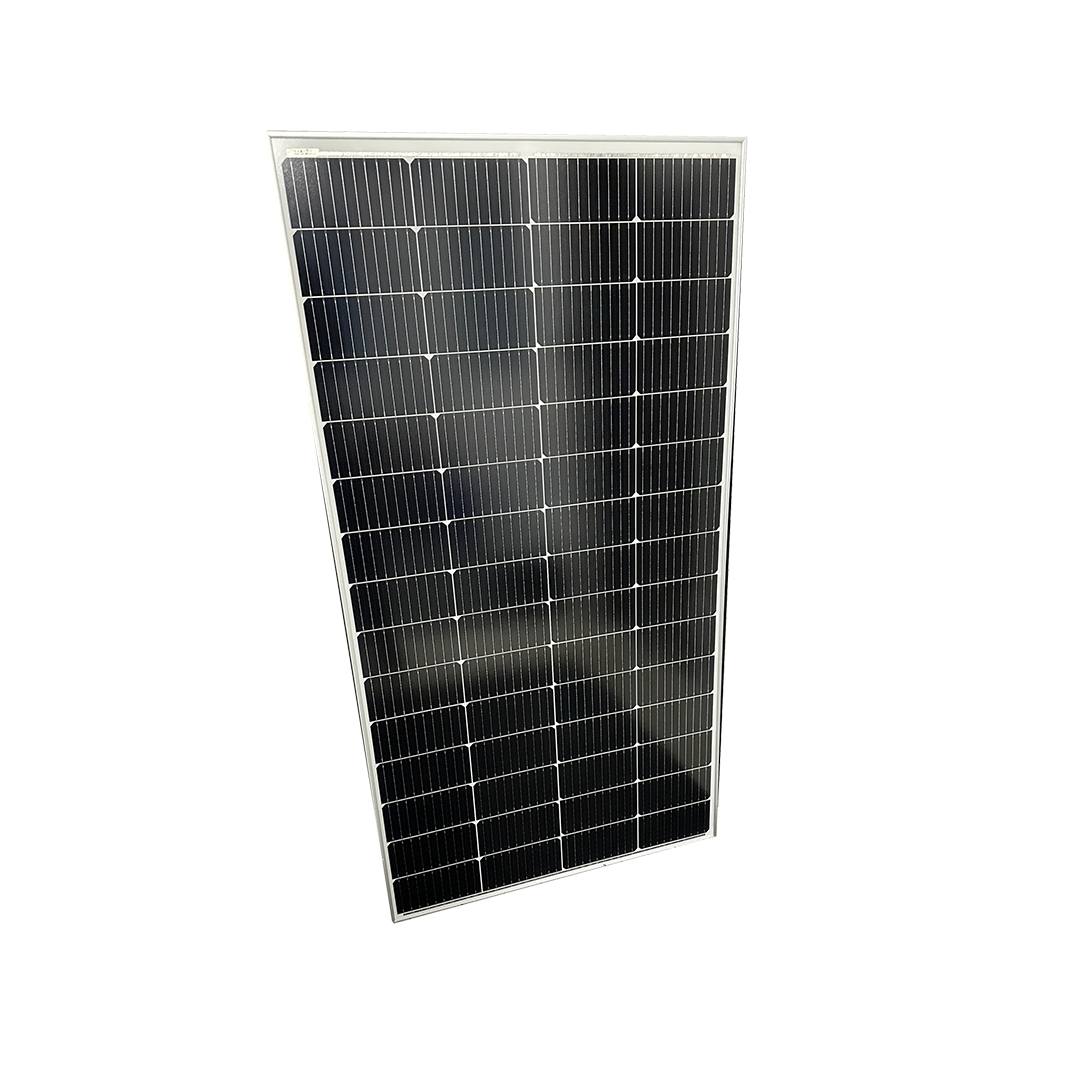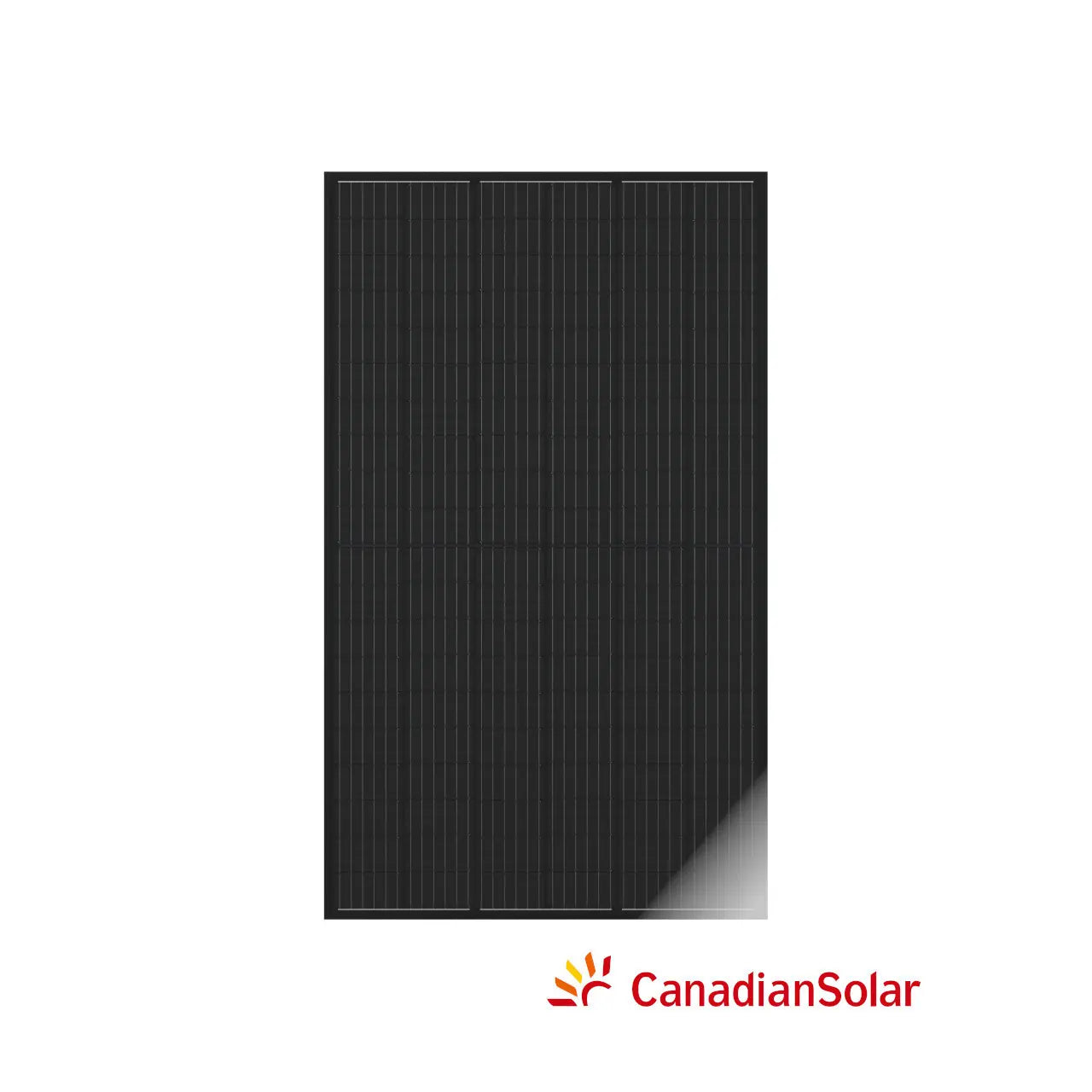-
Canadian Solar TOPHiKu6 All-Black 445W N-Type TOPCon Solar PanelCanadian Solar’s TOPHiKu6 All-Black 445W (CS6.2-48TM-H) represents the next generation of high-performance solar panels. Built with N-Type TOPCon monocrystalline cells, this module delivers superior efficiency, long-term reliability, and modern all-black aesthetics that blend seamlessly with residential and commercial rooftops. With an impressive 445-watt power...
- Regular price
- $199.00
- Regular price
-
$249.00 - Sale price
- $199.00
- Unit price
- per
-
JA Solar 500W All-Black Solar Panel – JAM60D41 LBJA Solar JAM60D41/LB 500–510W All-Black Bifacial Solar Panels Enhance your solar power system with the sleek JA Solar JAM60D41/LB All-Black bifacial module, typically supplied in the 500W class. Built with high-efficiency PERC monocrystalline cells, this panel combines powerful performance with modern aesthetics — making...
- Regular price
- $199.99
- Regular price
-
$229.00 - Sale price
- $199.99
- Unit price
- per
-
Jinko Solar 535W Solar PanelJinko Eagle G5B 535 Solar Panel Bifacial Power Gain The advantages of Bifacial Power Gain are evident; their bifacial cell design not only increases performance from the backside but also promises a prolonged power yield throughout the module's lifespan. Light-Weight Design With a...
- Regular price
- $249.00
- Regular price
-
$353.22 - Sale price
- $249.00
- Unit price
- per
-
SWE-230M-60 230W Solar PanelsProduct Dimensions: 1441 x 770 x 30 mm - 57 x 30.3 x 1.2 inches Item Weight: 13.1kg - 28.9lbs cETL Approved for the Canadian Market with a 10/25 Year Warranty Mono crystalline modules designed for off-grid applications. High power output of more than...
- Regular price
- $254.74
- Regular price
-
$286.66 - Sale price
- $254.74
- Unit price
- per
-
220W Lumera Bifacial Solar Panel Canadian MadeLumera Solar 220W Monocrystalline Solar Panel – Made in Canada Discover the best Canadian-made solar panel for your energy needs. The Lumera Solar 220W panel delivers high efficiency and durability in a compact form — perfect for RVs, boats, cabins, or any off-grid system....
- Regular price
- $299.27
- Regular price
-
$399.99 - Sale price
- $299.27
- Unit price
- per
-
Victron Folding Solar Panel Kit 220WVictron 220W Folding Solar Panel Kit Charge up your battery using this 220Watt folding solar panel kit and the sun’s energy. It is very easy and quick to connect the panels to a battery (not included) and then you can connect an inverter (not...
- Regular price
- $499.95
- Regular price
-
- Sale price
- $499.95
- Unit price
- per
-
Victron Folding Solar Panel Kit 160WVictron 160W Folding Solar Panel Kit Charge up your battery using this 160Watt folding solar panel kit and the sun’s energy. It is very easy and quick to connect the panels to a battery (not included) and then you can connect an inverter (not...
- Regular price
- $375.74
- Regular price
-
$425.74 - Sale price
- $375.74
- Unit price
- per
-
Canadian Solar TOPHiKu6 All-Black 445W N-Type TOPCon Solar Panels — Full Pallet (31 Panels)Canadian Solar’s TOPHiKu6 All-Black 445W Pallet (31 Panels) — CS6.2-48TM-H offers a complete bulk solution for installers, contractors, and large residential or commercial projects. This pallet includes 31 high-efficiency N-Type TOPCon monocrystalline solar panels, engineered to deliver superior performance, exceptional reliability, and sleek all-black...
- Regular price
- $5,208.00
- Regular price
-
$6,200.00 - Sale price
- $5,208.00
- Unit price
- per
-
JA Solar 500W Solar Panel Pallet – Full Pallet (36 Units)JA Solar JAM60D41/LB 500–510W All-Black Bifacial Solar Panels – Pallet (36 Units) Boost your solar projects with a full pallet of 36 JA Solar JAM60D41/LB panels. These premium 500W–510W All-Black bifacial modules are built with high-efficiency PERC monocrystalline cells, offering powerful performance with modern...
- Regular price
- $5,832.00
- Regular price
-
$6,480.00 - Sale price
- $5,832.00
- Unit price
- per
-
Jinko Solar 535W Solar Panel - Pallet of 27 Solar PanelsJinko Eagle G5B 535 Solar Panel - Bulk Pallet of 27 Solar Panels Bifacial Power Gain The advantages of Bifacial Power Gain are evident; their bifacial cell design not only increases performance from the backside but also promises a prolonged power yield throughout...
- Regular price
- $5,998.00
- Regular price
-
$9,536.94 - Sale price
- $5,998.00
- Unit price
- per
Choose Your Solar Panel
Compare Our Best-Selling Solar Panels
| Feature | Lumera 220W |
Switch Energy 230W |
JA Solar 500W |
Canadian Solar™ 500W |
Jinko 535W |
|---|---|---|---|---|---|
| Image |  |
 |
 |
 |
 |
| Wattage | 220W | 230W | 500W | 500W | 535W |
| Brand | Lumera | Switch Energy | JA Solar | Canadian Solar™ | Jinko Solar |
| Applications | RVs, vans, camping, boats/marine, small off-grid loads | Off-grid cabins, 12V battery banks, backup power, boats/marine | High-power bifacial panel for homes & cottages | All-black panel for Canadian homes & cottages | Large roofs, ground mounts & high-output arrays |
| Dimensions | 141 × 70 × 3.5 cm (55.5 × 27.6 × 1.38 in) | 144.5 × 77 × 3 cm (57 × 30.3 × 1.2 in) | 195.3 × 113.4 × 3.0 cm (76.9 × 44.6 × 1.18 in) | 176.2 × 113.4 × 3.5 cm (69.4 × 44.6 × 1.38 in) | 227.4 × 113.4 × 4 cm (89.5 × 44.6 × 1.57 in) |
| Weight | 24.12 lbs (10.94 kg) | 28.9 lbs (13.1 kg) | 60 lbs (27.3 kg) | 48.1 lbs (21.8 kg) | 64.82 lbs (29.4 kg) |
| View Product | View Lumera 220W | View SE 230W | View JA Solar 500W | View Canadian Solar 500W | View Jinko 535W |
HOW DO SOLAR PANELS WORK?
Whether you're powering a stationary home with a solar panel roof or a mobile dwelling like a boat or RV with portable solar panels, solar panels follow the same fundamental process to convert sunlight into usable electricity. Here's a breakdown of the key steps:
- Photovoltaic Effect: The solar panels, including those in solar panel kits, are made up of photovoltaic (PV) cells composed of semiconductor materials like silicon. When sunlight (photons) strikes these PV cells, it knocks electrons loose from the atoms, allowing them to flow and generate an electric current through the photovoltaic effect.
- Direct Current Generation: The freed electrons create an electrical circuit within the solar cells, generating direct current (DC) electricity. However, most household appliances and electronics require alternating current (AC) to operate.
- Inverter Conversion: This is where solar inverters come into play. For homes, a central inverter converts the DC electricity from the solar panels into AC electricity that can power the home's electrical systems. For boats and RVs equipped with portable solar kits, smaller inverters perform the same DC-to-AC conversion to supply the onboard electrical loads.
- Energy Distribution and Storage: In a home solar system, the converted AC electricity flows through the electrical panel and wiring to power lights, appliances, and other loads. Excess energy can be stored in batteries or fed back to the utility grid (if grid-tied). For boats and RVs, the AC electricity from the inverter powers the onboard electrical systems and charges the batteries. These batteries store the excess energy for use when the solar panels are not producing power, such as at night or during cloudy conditions.
- Off-Grid or Grid-Tied: Homes can be set up as off-grid solar systems, relying entirely on solar power and battery storage, or grid-tied systems that remain connected to the utility grid as a backup or for selling excess energy. Boats and RVs typically operate as off-grid solar systems with portable solar panel kits, using batteries to store energy for when the solar panels are not generating power, ensuring a reliable source of electricity while on the move or anchored.
By harnessing the abundant and renewable energy from the sun, solar panels provide a clean and sustainable way to meet the electricity needs of homes, boats, and RVs, reducing reliance on traditional power sources and enabling greater energy independence.
CUSTOMERS ALSO VIEWED THESE ITEMS
- Regular price
- $1,895.00
- Regular price
-
$2,850.00 - Sale price
- $1,895.00
- Unit price
- per
- Regular price
- $723.13
- Regular price
-
$873.13 - Sale price
- $723.13
- Unit price
- per
- Regular price
- $2,150.00
- Regular price
-
- Sale price
- $2,150.00
- Unit price
- per
- Regular price
- $5,624.09
- Regular price
-
$6,587.92 - Sale price
- $5,624.09
- Unit price
- per
- Regular price
- $1,356.66
- Regular price
-
$1,646.26 - Sale price
- $1,356.66
- Unit price
- per
 Solar Panels FAQ
Solar Panels FAQ
Solar panel prices in Canada vary depending on wattage, brand, and technology.
Most high-efficiency panels typically range from mid-$200s to $400+.
However, we also offer special bulk pricing such as:
🔥 $170 per panel when you buy 3 or more
of the Canadian Solar TOPHiKu6 All Black 445W panel
(discount applied automatically at checkout).
This makes it one of the best-value solar panels available in Canada.
Most Canadian homes require 15–30 solar panels, depending on energy use, shading, and the wattage of the panel. You can calculate your exact needs or read our full guide: How many solar panels do I need?
Yes. Canada has excellent solar potential and rising electricity prices. Solar panels can significantly reduce long-term hydro costs and increase home value, especially in BC, Alberta, Saskatchewan, and Ontario.
Monocrystalline panels—especially N-Type TOPCon and PERC technologies— perform best in Canada. They offer excellent low-light performance, high efficiency, and strong snow/wind-load durability for winter climates.
Yes. We ship solar panels and equipment across most provinces in Canada. Shipping costs are calculated automatically at checkout based on your location and the size of your order.
Absolutely. Our panels are compatible with off-grid, grid-tied, and hybrid systems. They can be used for cabins, RVs, cottages, homes, farms, and commercial applications.
We offer top solar brands including: Canadian Solar, JA Solar, REC, Jinko, Thornova, Longi and more. All modules come from authorized suppliers with full warranties.
Solar panels typically last 25–30 years. Many high-quality N-Type modules experience very slow degradation, ensuring strong energy production for decades.
Most of our solar panels include:
• 10–25 year product warranty
• 25–30 year performance warranty
Warranty details vary by brand and model.
Yes. Solar panels can be installed on most roofs including shingle, metal, flat, and composite surfaces. South-facing roofs with minimal shading offer the best performance.
Need help to get the best Solar Panel?
- Choosing a selection results in a full page refresh.























